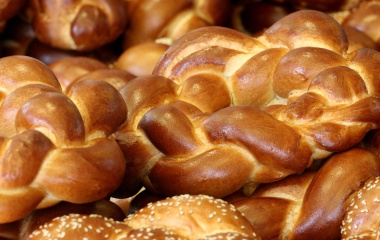
“It is said of the olah sacrifice of cattle, ‘rei’ach nichoach, an offering made by fire of pleasing odor’ (Vayikra 1:9); and [it is said] of the olah sacrifice of birds, ‘An offering made by fire of pleasing odor (Vayikra 1:17); and [it is said] of a grain offering, ‘An offering made by fire of pleasing odor’ (Vayikra 2:2), to teach you that whether one offers much or little [it matters little], so long as one directs one’s heart to heaven” (Menachot 110a).
The first two masechtot, tractates, of seder Kodshim detail the laws of animal and flour sacrifices. The details are many and then some—there is no area of halacha as regulated and regimented as that of korbanot. But when all is said and done, we can sum up some 250 talmudic pages with the idea that, “G-d desires the heart” and is unimpressed by elaborate offerings.
Offering a simple handful of flour can be an equal or even greater display of love of G-d than offering a large cow. It all depends on our motivation in doing so—something that only G-d can truly know. A korban is a way to lehitkarev, to come closer, to G-d and the simplest of offerings done sincerely is of no less value than a most elaborate one. Doing more is not always better and at times, can even be worse. How much we spend is far less important than how we spend it.
This is the basis of the korban olah v’yored, literally, “the up and down sacrifice”. The Torah allows or, shall we say, demands that in certain situations[1], the korban one brings is to be determined by one’s level of wealth. Those of means were to bring an animal, those of more moderate means were to offer fowl and those of even lesser means were to bring a flour offering. As the Sefer Hachinuch (Mitzva 123) notes, one who is entitled to bring a flour offering but brings an animal offering instead has not fulfilled their obligation. If G-d says we need not spend the money on an animal sacrifice, we should not do so[2]. G-d does not need the animal and while one must bring a sacrifice, a less expensive one will more than do.
Spending beyond one’s means on religious rituals may also be a form of yuhara, religious hubris; trying to show others to what lengths we go to service G-d. The Sefer Hachinuch is even afraid that one may come to theft in order to be able spend more on “religious” items.
It is for this reason that Jewish law forbids one to spend more than 20% of one’s income in the performance of a mitzvah (Orach Chaim 656). “The Torah has mercy on the money of the Jewish people" (Ketubot 50a). Fascinatingly, many authorities rule that one may even violate a negative command, albeit one that is done passively[3], rather than spend more than 20% of one’s income to avoid the prohibition (see commnetaries to Yoreh Deah 157:2).
It is most understandable that regarding mitzvot between man and G-d we need not, and should not, spend excessively. G-d wants our hearts, not our money. What is perhaps somewhat surprising is that this idea is also applicable in mitzvot between man and man.
In delineating the hierarchy of charitable giving, our tradition teaches that it is better to give less with a smile than more begrudgingly. We could understand this on the basis that every mitzvah between man and man is also a mitzvah between man and G-d; after all, man is created in G-d’s image. More significantly, the mitzvah of tzedakah is one incumbent on the donor[4]. Tzedakah allows us to share our blessings with others, and underlines the necessity to express gratitude and thanks. Doing so begrudgingly misses the entire point of tzedakah. Ironically, research shows that those who give charity are happier people[5].
As the Mishna notes, the Torah uses the term rei’ach nichoach, a sweet smell, to describe the essence of a korban. The sense of smell is one of anticipation. One enters a home on Friday afternoon and the beautiful fragrance prepares one for the delicious meal ahead. We smell before we see and act. The korban is the “heads-up” we give to G-d that our actions will soon match our words, that we will do better moving forward.
Of all the senses, that of smell is the most sensitive. We can remember smells with much better accuracy than we can recall what we saw. Just recalling a pleasant (or not-so-pleasant) smell can bring us joy (or make us recoil). Long after the act of bringing a korban is forgotten, its “smell” must continue to linger. To quote Sir Henry Royce (co-founder of the Rolls-Royce company), “The quality is remembered long after the price is forgotten.”
[1] The specific cases, (see Vayikra chapter 5) are one who is subpoenaed to testify in court and falsely swears that he has no evidence to share, one who inadvertently eats of sacrificial food or enters the Temple in a state of impurity, and one who violates an oath that he took.
[2] For those who can afford to do it, it is most appropriate to spend a little more to beautify the mitzvah, i.e., while one can use any cup to make Kiddush, those who can afford to do so should use a silver one.
[3] Examples of negative commands violated passively include the prohibition to own chametz on Pesach, and standing idly by while a wrong is being committed,
[4] The main obligation on the recipient is do everything possible to avoid the need for tzedakah, taking as little as possible, and only when absolutely necessary.
[5] To see some beautiful examples of this, please read the accompanying notes of many who have signed on to The Giving Pledge.



